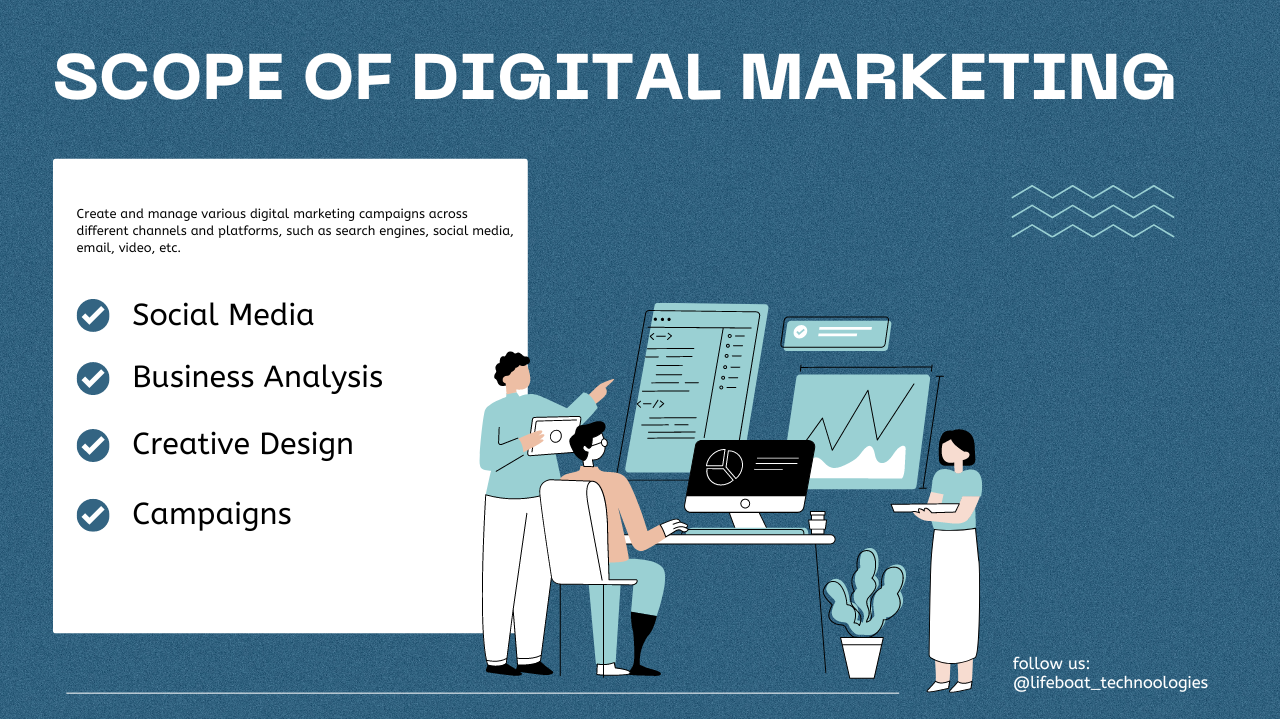

Digital marketing has revolutionized the way businesses
connect with consumers, reshaping the marketing landscape and
offering remarkable growth opportunities. In 2024, digital
marketing continues to expand, driven by technological
advances, evolving consumer behavior, and an increasing
dependence on data. Whether you are a startup or an
established brand, understanding the scope of digital
marketing is crucial for tapping into its huge possibility.
Our blog will explore the key areas shaping the digital
marketing landscape, and the benefits they offer.
1. Search Engine Optimization (SEO)
2. Pay-Per-Click Advertising (PPC)
3. Social Media Marketing (SMM)
4. Content Marketing
5. Mobile Marketing
6. Analytics and Data Science

1. Search Engine Optimization (SEO)
- On-page SEO involves optimizing individual web pages to improve their rankings on search engines. This includes focusing on keywords, content, and HTML structure
- Off-page SEO Building backlinks and domain authority involves strategies like guest posting and social sharing.
- Technical SEO Ensures that websites have a strong technical foundation, including factors such as speed, mobile-friendliness, and security, to enhance their rankings on search engines like Google.
2. Pay-Per-Click Advertising (PPC)
- Google Ads: process of designing and launching paid advertisements that are displayed prominently at the top of search engine results pages. These ads are created as part of a paid search marketing strategy to increase visibility and attract potential customers who are actively searching for relevant products or services.
- Social media advertising: Running advertisements on popular social media platforms such as Facebook, Instagram, and LinkedIn can help to reach a wider audience and engage with potential customers.
- Display advertising: Placing advertisements on websites and mobile apps involves the process of strategically selecting and displaying promotional content to target audiences. This can be done through various ad formats such as banners, pop-ups, or native ads, and it often involves negotiating with website owners or app developers for ad placement. The goal is to reach potential customers and drive engagement or conversions for the advertised products or services.
3. Social Media Marketing (SMM)
- Community building: Engaging with followers involves interacting with them, responding to their comments, and creating content that resonates with them. Building relationships means establishing trust, showing authenticity, and consistently providing value to your audience.
- Content creation: Creating and sharing relevant, engaging content" means producing and distributing information that is both applicable to the audience and captures their interest. This can include articles, videos, social media posts, and other forms of media that are designed to inform, entertain, or inspire the intended audience. The goal is to connect with the audience in a meaningful way and encourage them to interact with the content.
- Social media advertising: Using paid advertisements involves investing money in placing ads on various platforms, such as social media, search engines, or websites, to expand your audience and increase visibility.
4. Content Marketing
- Creating valuable content: The process involves the creation of various forms of content such as blog posts, articles, videos, and infographics.
- SEO optimization: Make sure that the content on your website or platform is set up in a way that makes it more likely to appear in search engine results when people look for related information. This involves using relevant keywords, creating high-quality content, and following best practices for search engine optimization (SEO).
- Distribution: Sharing content on social media and other channels" means distributing or posting information, such as articles, videos, or images, on platforms like Facebook, Instagram, Twitter, and other communication channels to reach a wider audience.
5. Mobile Marketing
- Mobile website optimization: Making sure that websites are designed and developed in a way that allows them to display and function correctly on mobile devices such as smartphones and tablets. This involves considering factors such as responsive design, mobile-friendly layouts, and fast loading times on mobile networks. By optimizing websites for mobile devices, businesses can provide a better user experience for visitors accessing their sites on mobile and improve their overall online presence.
- Mobile app development: The process involves the development of software applications specifically designed to interact and connect with customers in a meaningful way. These applications are intended to facilitate engagement and communication between the business and its customers.
- Mobile advertising: Targeting mobile users with ads involves tailoring advertising campaigns specifically for people who use mobile devices such as smartphones and tablets. This can include creating ads that are optimized for mobile viewing, targeting mobile apps, and using location-based targeting to reach users while they are on the go. Overall, the goal is to effectively reach and engage with the growing population of mobile users.
6. Analytics and Data Science
- Tracking website performance: Use of analytics tools to monitor and analyze the flow of visitors to a website and their interactions and actions while browsing the site.
- Data-driven decision-making: Using information and data to make decisions about how to market products or services and to improve advertising and promotional activities. By analyzing data, businesses can make more informed choices about their marketing strategies and make their campaigns more effective.
- Predictive analytics: Using information and data analysis to make predictions about what will happen in the future and how customers will behave. It involves using data to anticipate trends and understand how customers are likely to act.
7. Affiliate Marketing
- Partnering with affiliates: Collaborating with individuals or businesses to promote products or services.
- Commission-based earnings: Earning a commission for each sale generated through affiliates.
- Tracking performance: Monitoring affiliate performance to optimize campaigns.
Conclusion :
The scope of digital marketing is expansive, and constantly evolving, and offers businesses massive opportunities to connect with their audience across multiple digital touchpoints. With the rise of new technologies, the importance of an A complete digital marketing strategy has never been higher. From SEO and content marketing to AI-driven personalization, digital marketing touches every element of a business’s online presence and growth potential. Contact us at contact@lifeboat.co.in for more information.


